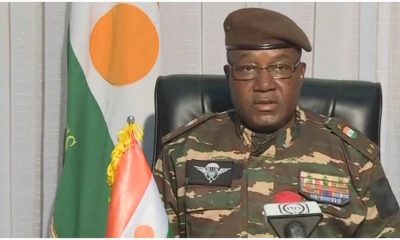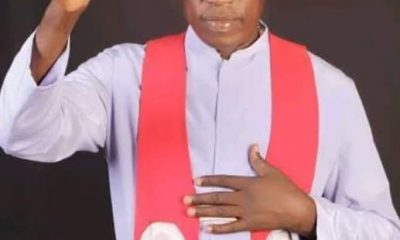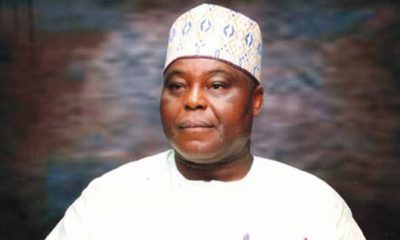News
TInubu call DSS to order

Daily Trust Editorial of Monday July 31, 2023
In his Democracy Day speech to Nigerians last month, then Speaker of the House of Representatives, Femi Gbajabiamila, now the top presidential aide, described President Bola Ahmed Tinubu as “a product of democracy” and “a thoroughbred democrat who is noted for his tenacious defence of democracy”.
We do not question the president’s claim to democratic credentials, but those credentials are now being put to test by the public behaviour of the Department of State Services (DSS), an agency that had its origins in Nigeria’s undemocratic past. How President Tinubu responds to the DSS’s increasingly erratic, and in several instances outrightly illegal behaviour towards Nigerian laws, sister agencies and citizens will go a long way in burnishing or tarnishing the President’s reputation as a democrat.
Unlike Tinubu, the DSS is not much known as a champion of democracy. Established near the twilight of military rule, the DSS was still an infant—scarcely a decade old—when Nigeria returned to democracy in 1999. By all reasonable expectations then, the agency should have matured along with democratic norms and practices. But few will credit the DSS with such a reputation. As late as last week, legal experts, civil society organizations and the media lambasted the DSS for yet more of its undemocratic practices, the litany of which, sadly, has by now become legion.
Not once but several times in the recent past, the DSS had laid siege on the National Assembly and barred members either from accessing their chambers, or from holding sessions. It has been on several occasions accused of interfering in election matters. Its men have clashed with those of other agencies, particularly the Police and the Armed Forces, sometimes at the real risk of agency-on-agency gun fights. The DSS has stormed or taken over buildings belonging to other government agencies, without legal warrants, in the name of conducting “investigations.”
And yet, as if in a bid to outdo its own undistinguished past, the DSS has literally run amok lately. We do not make this assertion lightly. First, we note, with concern that the DSS has conducted its activities more in the open and on the pages of newspapers than in the clandestine fashion required of an organization originally designed to be known only by its positive impact on internal security, but not to be seen or heard. This much was raised lately by many newspapers and civil society organizations in the country.
More worrisome still, the DSS has turned incompetent aggression into an operational method of sorts. In December, the Chief Judge of the Federal High Court, no less, declined, for lack of sufficient evidence, an application by the DSS to arrest and detain then Governor of the Central Bank, Mr Godwin Emefiele, in order to pursue further investigations into allegations of “terrorism financing and economic crimes” against him.
Two weeks ago, three separate judges ruled that the DSS should release Mr Emefiele or charge him to court after having detained him since 10th June. The DSS then proceeded to court, but rather than with charges for terrorism financing or other economic crimes, the agency charged Emefiele for illegal possession of firearms and , leaving Nigerians asking, ‘what took you so long if this was all you had?
Still, when a judge granted Emefiele bail for that, the DSS promptly re-arrested him for yet to be disclosed charges, never mind the public show of shame between the DSS operatives and officials of the Nigeria Correctional Service who, by law, should have custody of accused persons processing bail terms and conditions.
We are deeply concerned by how the DSS has conducted itself in public through all these proceedings. First, all of these point to incompetence for an agency that should do its homework about allegations it makes against citizens before going public with them. Otherwise, security agencies are known to secretly share classified information with legislators and judges when pursuing sensitive cases that cannot be publicly disclosed. If this be the case with Emefiele, all the DSS needs to do is to share evidence of its allegations with respective judges and pursue the case more competently in classified fashion, rather than turn itself into a laughing stock before the whole nation.
We are equally concerned because Nigeria currently faces internal security challenges from disparate collection of non-state actors, from insurgents in the Northeast, to violent secessionists in the Southeast, to bandits and organized criminals almost everywhere else.
These are the challenges the DSS should be best equipped to help the Nigerian State deal with as a secret Police outfit. But to do that requires credibility and public confidence of Nigerians, both of which are now being frittered away.
We, therefore, call on President Tinubu to call the DSS to order. A democrat must oversee institutions that are seen to be democratic.
News
INEC rejects petition to recall Natasha

A petition to recall the Senator representing Kogi Central District, Natasha Ajpoti-Uduagban, has been rejected by the Independent National Electoral Commission, INEC.
The Commission in a statement on Thursday said that the petition did not meet the requirements for recalling a senator of the Federal Republic of Nigeria.
The Commission recently formally received a petition from constituents of Senator Natasha Akpoti-Uduaghan, calling for the commencement of her recall process.
The Secretary to the Commission, Rose Oriaran-Anthony, received the petition which was submitted at INEC’s headquarters in Abuja on Monday.
Natasha, who represents Kogi central in the Senate, is currently on suspension for allegedly flouting the Senate rules.
According to the petitioners, over 250,000 constituents’ signed the petition, out of about 480,000 registered voters in the senatorial district.
The petition was titled _Constituents’ Petition for the Recall of Senator Natasha Akpoti-Uduaghan on Grounds of Loss of Confidence’.
In a brief statement on Thursday, the Commission said, “The petition for the recall of the Senato representing the Kogi Central Senatorial District has not met the requirement of Section 69(a) of the Constitution of the Federal Republic of
Nigeria 1999 (as amended).”
Details later….
News
Six simple steps to avoid stroke

According to health experts, these are some steps you can take to reduce the risk of having stroke
1. Avoid smoking
Experts say the most important thing to do to improve brain health is to quit smoking cigarettes and vapes.
Apart from accelerating brain aging and increasing the risk for dementia, smoking causes damage to blood vessel walls in the brain and reduces overall oxygen levels due to the carbon monoxide in tobacco – making the body more prone to having a stroke.
2. Reduce blood sugar levels
High blood sugar (hyperglycemia) is a significant risk factor for stroke as it can damage blood vessels, which can lead to blood clots that travel to the brain.
Over time, excessive blood glucose can result in increased fatty deposits or clots in blood vessels. These clots can narrow or block blood vessels in the brain.
3. Maintain a healthy weight and diet
Being overweight and eating unbalanced meals can significantly amplify risks for having a stroke. Carrying too much weight increases your risk of high blood pressure, heart disease, high cholesterol and Type 2 diabetes – all of which can damage blood cells, impact oxygen levels and contribute to higher stroke risk.
4. Regular Exercise
You need regular exercise to stay healthy and avoid stroke. Exercise should be spread evenly over four to five days a week, or every day. Do strengthening activities, usually more than two days per week.
5. Get Enough Sleep
While not a direct cause, poor sleep and sleep disorders, especially sleep apnea, are linked to an increased risk of stroke, potentially due to inflammation, reduced oxygen levels and blood flow to the brain.
The risk of stroke symptoms is four times greater among individuals who slept fewer than six hours a night compared to individuals who reported seven to eight hours of sleep a night.
However, experts also warn that ‘Too much sleep is also associated with increased stroke risk, so try to stay as active as possible so you can sleep as well as possible.’
6. Regular Checkup
You are expected to go for overall medical checkup regularly to ensure really detection and treatment of I’ll health.
News
Netanyahu ignores ICC warrant, arrives in Hungary

Benjamin Netanyahu, the Israeli Prime Minister, arrived in Budapest early morning on Thursday, marking his first visit to Europe since 2023, despite an International Criminal Court (ICC) arrest warrant against him.
Hungarian Prime Minister Viktor Orban invited Netanyahu last November, promising Hungary would not enforce the ICC arrest warrant, which he called politically motivated.
The ICC issued arrest warrants for Netanyahu and former Defense Minister Yoav Gallant, accusing them of crimes against humanity and war crimes, including using starvation as a weapon towards Palestinians in Israel’s war against Hamas in Gaza.
Hamas is recognized as a terrorist organization by the US, the EU, and Israel, among others.
Hungary’s Defense Minister Kristof Szalay-Bobrovniczky received Netanyahu at the airport with military honours.
Orban is expected to back Netanyahu on US President Donald Trump’s plan to relocate Palestinians from Gaza. That plan has been criticized by UN experts as ethnic cleansing.
Experts say Netanyahu is strategically visiting countries where he faces no risk of arrest, aiming to gradually normalize his international travel.
In February, Germany’s chancellor-in-waiting Friedrich Merz said he will find “ways and means” for Netanyahu to visit Germany.
-

 News2 years ago
News2 years agoBreaking: Tinubu’s authentic ministerial nominees
-

 News2 years ago
News2 years ago“Anytime we want to kill terrorists, President would ask us to take permission from France but they were killing our soldiers-” Niger Republic coup leader
-

 News1 year ago
News1 year ago“I’m leaving the Catholic church because Bishop Onah is oppressing me,” says Okunerere
-

 News2 years ago
News2 years agoDokpesi and the Gazebo Mystique
-

 News2 years ago
News2 years agoRadio Nigeria’s veteran broadcaster Kelvin Ugwu dies three months after retirement from service
-

 News11 months ago
News11 months agoPersons against Allagoa’s reforms behind protests at NSITF
-

 News2 years ago
News2 years agoTsunami: Tinubu orders dissolution of managements, boards of MDAs, to sack all Buhari’s political appointees
-

 News2 years ago
News2 years agoLast minutes fever: Nigerian Hunters Service optimistic as Buhari signs five Bills into law

